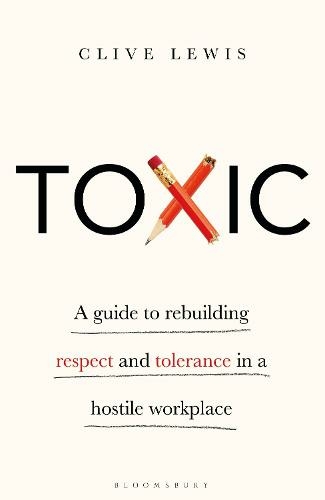I remember a time when I felt terrified by my own "inner emptiness" and "the void" in my life. Two phrases that stood out for me from Clive Lewis' book, "Toxic." I was searching for meaning.
I can see myself now: sitting cross-legged on my bed with tears pouring down my face. All as I tried to explain to the person on the other end of the phone how dreadful I felt. And why I couldn't face going back to work.
The doctor had signed me off with a list of reasons so long that it barely fitted on the sick note. Grief, bereavement, depression, anxiety, stress, and other words to that effect. Yet that lengthy diagnosis didn't do justice to how bereft I felt.
Meaning and Meaningless
If only I'd had Lewis' book "Toxic: A Guide to Rebuilding Respect and Tolerance in a Hostile Workplace," by my side. It might have helped me to make sense of myself.
In this excellent book, Lewis argues that many workers today suffer a feeling of "total and utter meaninglessness." That they "lack the awareness of a meaning worth living for." They suffer from what psychiatrist and neurologist Victor Frankl referred to as "the existential vacuum."
These phrases describe exactly how I was feeling back then. Granted, my father had died; I'd lost a parent in my mid-30s. It was a time when I was single, without children, living alone, and far away from other family members. It was a big deal.
But the emptiness I felt was bigger than my grief. Or maybe grief put me in touch with the void.
As I stared out of the window of my one-bedroom flat, I wondered what on earth I'd been striving for. Is this it? I asked.
The Meaning of Life
I'd given my all to my career. And in return, my career had given me a sense of achievement, a sense of belonging, opportunities for adventure, and bucketloads of adrenaline.
The problem was I'd given so much that I had nothing left. I felt exhausted, empty and alone. I'd worked my socks off. But for what?
What was even more confusing was that I had an amazing job. I was, during this psychological crisis, a political journalist for Reuters. I worked at a desk in the U.K. Parliament and regularly popped into Downing Street or traveled on the Prime Minister's plane.
Shouldn't I feel happy and fulfilled? I see now that the job, no matter how impressive it was, was no longer fulfilling me at all. There had to be something more, a different way to use my talents.
Potential Pitfalls
In "Toxic," Lewis also says that mental health issues are often based on the tension between what one has achieved and what one has the potential to become.
I knew I had more potential but didn't know how to do anything else. Until it dawned on me that, instead of writing about politics, I could write about myself.
I started to blog about how lost I felt, by then aged 40, still single and childless, still trying to figure out what to do with my life. Shouldn't I have this sorted by now? I blogged about my struggles with an eating disorder and my tendency to fall into unhealthy relationships. I blogged about the stuff that meant something to me.
As I wrote from the heart, people in the same boat – mostly professional women with impressive careers but no partners and no kids – wrote and thanked me for telling their stories. For helping them to make sense of their lives. And that feedback meant more to me than my most-read Reuters stories, even the ones that ended up in prestigious newspapers.
Solve the Evolve Conundrum
This sense of meaning I'd found gave me the courage and the energy to keep going, to write a book and to build a business that supports others and brings me fulfillment.
So, what can organizations, businesses, and managers, learn from my experience of breakdown? And what too from what Lewis says in this book about the importance of finding meaning?
The key takeaway, I think, is to understand what makes people tick. But to also appreciate that what made them tick in their 30s, may no longer make them tick in their 40s or 50s.
As humans, we change and evolve and some of us need our careers to evolve with us. If they don't, we may lose that sense of meaning.
Meaning Makes Business Sense
We may become depressed, we may take out our resentment on colleagues at work – become the bullies or bad managers Lewis writes about. We may fall ill, physically or mentally, or we may look elsewhere for more fulfilling work.
It may be a tall order but making sure employees feel a sense of meaning makes perfect business sense.
I like to imagine a utopia where everyone is playing to their strengths and achieving their full potential, with balance and self-care. In a world in which employees are happy and healthy, their loved ones are too, and organizations flourish and prosper.
Lewis' statistics on employee disengagement and the picture he paints of toxic workplaces suggest we have a long way to go. But his tally of the huge personal and financial costs of mental health issues suggests this dream is worth fighting for.
Download Our "Toxic" Book Insight
We review the best new business books and the tested classics in our monthly Book Insights, available as text or as 15-minute audio downloads.
So, if you're a Mind Tools Premium Club member or corporate user, download or stream the "Toxic" Book Insight review now.
If you haven't already signed up, join the Mind Tools Club and gain access to our 2,400+ resources, including 390+ Book Insights. For corporate licensing, ask for a demo with one of our team.
Have you experienced a "Toxic" workplace? How did you cope? Let us know in the comments!







